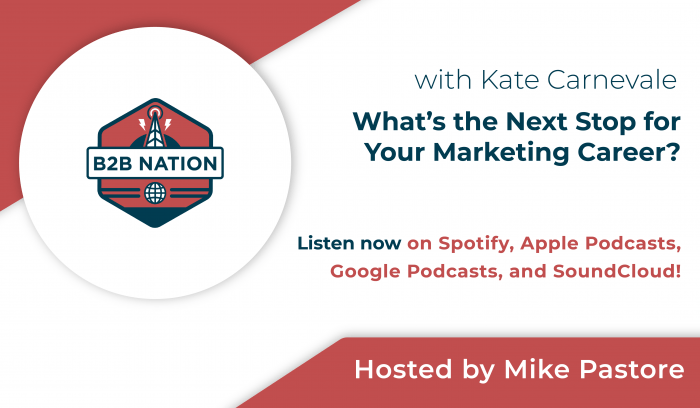There are more roles in marketing, open to more skillsets, and more areas of interest than ever before.
The advent of marketing technology (martech), the rise of marketing operations (marketing ops), and the infusion of data and analytics into all things marketing are creating opportunities for people with talents who might not have found a home in marketing a decade ago.
Where will your career in marketing take you next?
In this episode of B2B Nation, we’re joined by Kate Carnevale of IBM, who shares her career journey, from journalism school, to political communications, to a marketing agency, to a small healthcare company, to managing global campaigns for one of the world’s most-recognized brands.
Among the topics we discuss:
- How does working for a large enterprise differ from a small business in addition to the budgets and resources?
- How does the marketing itself change when you go to work for a global enterprise?
- Can you still find opportunities to be entrepreneurial or “scrappy” in a large organization?
Podcast Highlights
8:08
Kate Carnevale:
There are pros and cons to being at smaller companies; there are pros and cons to being at bigger companies. I remember during the interview process [at IBM], pretty much everyone I spoke to mentioned a highly matricized environment. And I guess I didn’t really fully understand that in the interview because I had always worked at small companies. If you needed something from somebody, you’d walk down the hall and say “Hey, what’s the production schedule on the video?” Or “When are we going to have that final content asset delivered?”
But at IBM you have teams spread out all over the world. You’ve got global teams that are on different time schedules. That part has been probably the biggest learning curve for me in terms of: How do you put campaigns into market when you’ve got resources literally everywhere? And working to communicate, articulate the objectives and have that have to be the same across the board for your global campaigns.
That has been the biggest learning curve for me. It’s a good challenge to have, right? To get to know people who come from a different background or have a different point of view, but that’s probably been the biggest learning curve.
Mike Pastore:
How is the marketing itself different at a global company like IBM? Off the top of my head, I think of smaller companies as maybe willing to take more risks with their messaging and larger companies playing it safe and basing everything on focus groups and data, and a lot of people reviewing the messaging, and a lot of layers. In what other ways is the marketing itself different?
Kate Carnevale:
That’s such a good question. You know, I think in smaller companies there’s an entrepreneurial mindset and sometimes a boot-strapping nature. But that’s still relevant at IBM. I think any marketing team at a big company has a choice to play it safe and to do what they’ve always done.
But I think, especially in the public cloud space, we are getting smarter and doing a number of things differently, even if we don’t have a ton of resources behind us. We’ve done a number of things this year where we’ve used tools in different ways.
We’ve got this really great content platform called PathFactory, and it was primarily used for event follow-up. And centralizing content for the sales team to communicate out to a client. And we said “Hey, there are other ways that we can use this. We can put this in front of a client even if they haven’t come to an event. We can take them down this very custom journey.” You know, we did that [work] with two people.
So I think definitely that mindset is still active at IBM. And I think in terms of the taking the risks, yes, we test our messaging, and yes, we run it by IT Council and people who are in the cloud space to see that we are spot on. We also see that our competitors are putting these amazing client stories into market that really bring their technology to life. And IBM works with the best clients in the world, so we have really tried to amplify those stories that give credibility to what we’re trying to do in this space.
